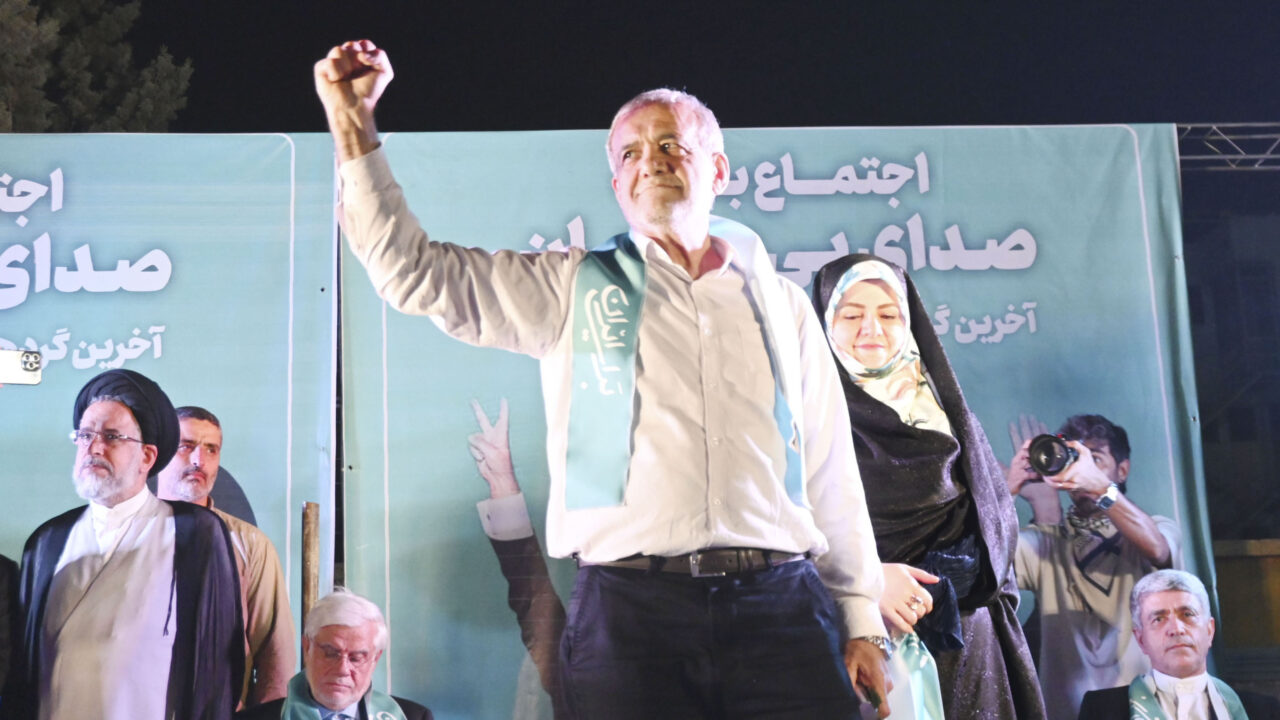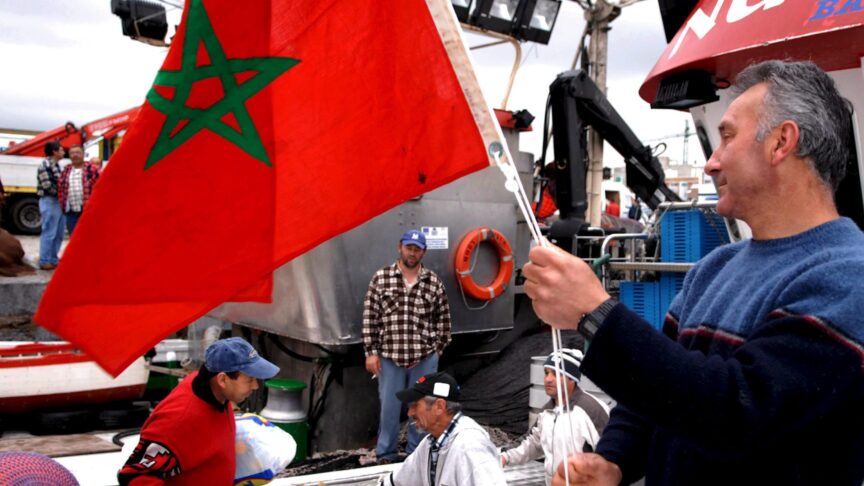Managed reform: What Iran’s new president means for European diplomacy
Under new president Masoud Pezeshkian, Iran will have a reform-minded government. Given the grave concern over Iran’s nuclear programme and regional posture, the West should seize the opportunity to pursue principled diplomacy with Tehran
Masoud Pezeshkian is Iran’s new president-elect. This follows the second round of a surprise election held on Friday after the sudden death of former Iranian president, the ultra-conservative Ebrahim Raisi. Raisi had entered into office in 2019, ushering in an incredibly rocky term for Iran’s domestic politics and relations with the West. Now Pezeshkian’s reform-minded government presents an unexpected opportunity for the West to press cautiously but meaningfully for a new diplomatic opening with Tehran to diminish threats posed by Iran’s nuclear programme and regional posture.
Pezeshkian – a medical surgeon, and former minister and parliamentarian – is affiliated with the so-called reformists camp in Iran’s political spectrum. A daunting list of challenges awaits him: an ailing economy debilitated by years of mismanagement and sanctions; deep social division following brutal crackdowns of the 2022 nationwide protests; and geopolitical tripwires that have brought Iran to the brink of war. Moreover, Pezeshkian’s room for manoeuvre will likely be curtailed by Iran’s political system, in which ultra-conservatives control all other centres of power.
But Pezeshkian’s ability to even run in the presidential election suggests that Iran’s supreme leader, Ayatollah Ali Khamenei, and his inner circle – which approved the list of candidates – acknowledge that recent upheavals have extensively tarnished the legitimacy of the Islamic Republic’s ruling elite. Thus, despite historic low voter turnout, Pezeshkian’s election reflects the extensive failure of Raisi’s hardline policies to deliver on economic and social issues. The new president now has the chance to push policy in a different direction – including, possibly, through new negotiations with the West.
During the campaign, Pezeshkian prioritised improving economic conditions, with a clear recognition that easing international sanctions through diplomacy over Iran’s nuclear programme was a necessity. Indeed, his chief foreign policy adviser during the campaign was former foreign minister Javad Zarif, who negotiated the 2015 nuclear deal. Zarif will likely play an influential role – directly or indirectly – in the new government.
This suggests that Pezeshkian is likely to attempt to delicately rebalance Iran’s relations with the West, following his predecessor’s sustained outreach towards Russia and China. He backs continued de-escalation with the Arab world and reducing regional tensions, suggesting that his government will seek to build further ties with Iran’s Arab Gulf neighbours, and be averse to further military conflict in the Middle East.
This will be no easy task. Pezeshkian faces a tough – perhaps impossible – job in garnering support from Iran’s supreme leader, who is the ultimate decision-maker on most national security matters. In recent years, Khamenei’s decisions on these files have been heavily steered by the Islamic Revolutionary Guard Corps and Iran’s more hardline political factions. But, given Iran’s internal economic demands, the nuclear file could be one area where his government has more room to manoeuvre.
Opportunity for diplomacy
In recent years, Europe’s relations with Iran have come close to rock-bottom following the 2022 Mahsa Amini protests; Iran’s deteriorating human rights record; the rapid advancement of its nuclear programme; and, most alarming for Europeans, Tehran’s military support for Russia following the country’s all-out invasion of Ukraine in 2022.
The acute risks of wider war in the Middle East, together with Iran’s unprecedented military cooperation with Russia and nuclear activities, pose major risks for Europe. The notable change of government in Iran therefore presents a much-needed opening for Western capitals to test principled diplomacy with Iran. The aim should be to convince Iran to halt, and then roll back, its nuclear programme, and prevent further military escalation in the Middle East.
Recent US diplomatic efforts with Tehran over “de-escalation deals” on nuclear issues and regional tensions (facilitated by Arab Gulf states) have stalled, partly due to the elections in Tehran and Washington. Iran’s surprise election has synchronised its presidential cycle with that of the United States, maximising time for diplomacy. However, in the immediate months ahead the US will be fully immersed in its own presidential election, with little bandwidth to engage with Tehran. France, the United Kingdom, and Germany (known as the E3), as well as the incoming EU high representative, are therefore best placed to lead further de-escalation deals, given their direct lines of communication to Tehran. Now the European election wave is over, the E3 governments also have more political space for this task.
To this end, the E3 and the EU should prepare to hold direct talks with Iran at the UN General Assembly in September, focusing on:
1. De-escalating military tensions in the Middle East
A strong focus of immediate diplomatic outreach should be on preventing further escalation in the Middle East, especially given growing concern about a war in Lebanon. Europeans should urge Iran to apply pressure on its allies – the Houthis in Yemen and Hezbollah in Lebanon – which are now close to a disastrous war with Israel to prevent further conflict. They should stress to Tehran that war between Israel and Lebanon would severely undermine prospects to ease US sanctions through diplomacy. Europeans need to combine this with strong messaging to Israel that a ceasefire in Gaza is necessary to prevent wider conflict.
2. Proposing a short-term political off-ramp to reduce Iranian nuclear expansion
Given Pezeshkian’s campaign focus on the economy and sanctions relief, his government will likely have a greater appetite to engage meaningfully in nuclear talks that deliver economic benefits. The E3 and EU should coordinate with Washington and their Arab allies to create viable pathways to concrete economic relief – but only if Iran is prepared to immediately roll back its nuclear programme. The most immediate measures from Iran should include greater transparency and cooperation with the International Atomic Energy Agency (IAEA), and halting its production of highly enriched uranium. Europe’s ability to provide Iran with economic relief is limited while US secondary sanctions remain, which may put Arab capitals in a better position to deliver. Notably, Arab Gulf states were among the first to congratulate Pezeshkian as president-elect, and are likely also interested in continuing to de-escalate tensions with Iran. But this would still require a green light from the US. Europe should therefore work closely with Washington to allow for the easing of sanctions enforcement, while ensuring that Arab-Iranian economic relations are tied to nuclear steps by Tehran. As part of this de-escalation process, Europeans can leverage their position on the IAEA’s board of governors, by promising to refrain from further censures against Iran.
3. Drafting a longer-term framework to contain Iran’s nuclear programme
Should a short-term nuclear arrangement be secured, European efforts should focus on drafting a long-term framework to contain Iran’s nuclear expansion objectives. This is urgent given that the UN Security Council resolution that enshrines the nuclear deal expires in October 2025. Europeans should therefore propose pathways to both Washington and Tehran to avoid a scenario which lifts critical international restriction on Iran’s nuclear programme – which would certainly result in renewed Western economic pressure against Tehran.
*
More intensive diplomacy with Tehran on the specific points above will require progress on other areas of contention too. Importantly, this includes the release of European citizens and political prisoners unjustly detained by Iran, and the halting of further executions. Europeans should also underscore that further Iranian military support to Russia will shut the door to diplomacy. In this remit, European governments will be assessing Pezeshkian’s ability to halt the transfer of ballistic missiles to Moscow – which has seen recent widespread speculation – as an indication of whether Iran is serious about negotiations with the West.
Deal-making with Iran will remain no easy task, especially given the hardline grip on power inside the country. However, Pezeshkian’s executive team – which is likely to include capable technocrats – can make a stronger push towards compromise and de-escalation with the West
Deal-making with Iran will remain no easy task, especially given the hardline grip on power inside the country. However, Pezeshkian’s executive team – which is likely to include capable technocrats – can make a stronger push towards compromise and de-escalation with the West. Pezeshkian may even have greater breathing room during the initial months of his presidency.
Diplomacy with Tehran will also be more difficult to advance should Donald Trump win the US presidential election and revive his “maximum pressure” policies on Iran. As such, there is a narrow window to lock in possible gains with Tehran before January 2025. Europeans should act quickly, with backing from the current Biden administration, rather than waiting for the result of the US election.
The European Council on Foreign Relations does not take collective positions. ECFR publications only represent the views of their individual authors.



